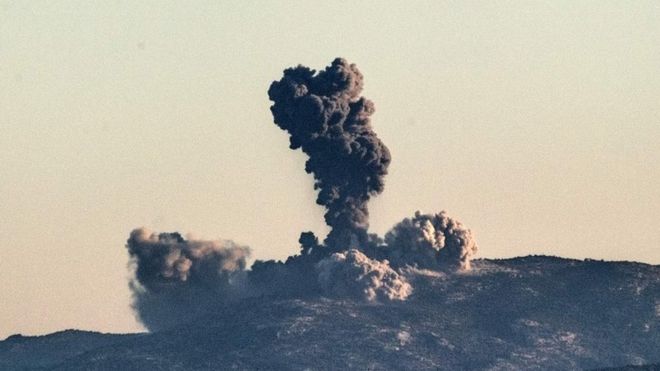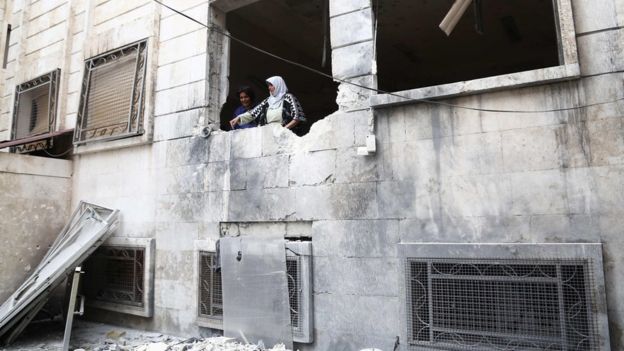
Turkish war planes have launched air strikes on Kurdish positions in northern Syria, in a move likely to cause tensions with the US.
Turkey is seeking to oust Kurdish fighters from Afrin, held by them since 2012. Some of these forces helped the US to fight the Islamic State group.
There are also reports of pro-Turkish Syrian rebels advancing on the city.
Turkey says it is launching a full military operation against these Kurds - which it considers a terrorist group.
President Recep Tayyip Erdogan has also threatened to strike at the city of Manbij - some 100km away from Afrin in another Kurdish area - as a next target.
Russia - a key military figure in the region - says it is concerned by the reports, but earlier said it would not interfere in the conflict.
Syria has previously warned against any operation and said it would shoot down Turkish planes.

Why is President Erdogan threatening US-backed groups?
The Kurdish YPG (Syrian Kurdish People's Protection Units) has been a key part of the battle against the group calling itself the Islamic State in Syria, and has been backed by the United States.
Turkey, however, believes the group has links to the banned Kurdistan Workers Party (PKK), and has been threatening to clear Kurdish fighters from both Afrin and Manbij for several months.
Its plans seem to have been accelerated by an announcement from the US that it will help the Syrian Democratic Forces (SDF) - an alliance against IS of which the YPG is a member - build a new "border security force" to prevent the return of IS.
The YPG and SDF deny any terrorist links - a claim backed by the US government.
But President Erdogan called the border force a "terror army".
Speaking at a meeting of his ruling AKP party, Mr Erdogan once again linked the YPG and other Syrian Kurdish groups to the Turkish PKK, an insurgent group considered a terrorist organisation by Turkey.
"The PKK, YPG, PYD are all the same; changing names does not change the fact that they are terror organisations," Turkey's Anadolu news agency quoted him as saying.
Disagreement over the Kurdish fighters has created a sharp division between the Nato allies.
The US state department has appealed for calm, and attempted to downplay portrayals of a new "border force", instead characterising the new development as security training.
"We do not believe that a military operation... serves the cause of regional stability, Syrian stability, or indeed Turkish concerns about the security of their border," it said.
What has happened in Afrin?
On Saturday, the Turkish army announced that a new campaign, dubbed "Olive Branch", had launched at 14:00 GMT, targeting the YPG and IS jihadists.
The operation would be carried out "with respect for Syria's territorial integrity", it added.
Turkish state media also reported that Syrian fighters backed by Turkey had started moving into the Afrin region.
Turkey's military has been shelling the area since Thursday, a move which it said was in response to fire coming from the area.
On Saturday, the SDF accused Turkey of using the bombardment as a smokescreen ahead of launching an offensive. A spokesperson for the group told Reuters news agency that it would have no choice but to defend itself if attacked.
Rizan Habou, of the Syrian Democratic Council in Afrin, told BBC Arabic that residents were seeking shelter.
"When the villages in Afrin are shelled, the civilians [including] women and children are forced to leave their houses and go to the relatively safer surrounding open space and farmland till the shelling stops," he said.
"The YPG and the civilians will defend Afrin to the last moment."
Afrin is isolated from two other self-declared Kurdish autonomous cantons - Kobani and Jazira.
Turkish-backed rebel forces took over a 100km (60-mile) area separating the territories after driving out IS in 2016 - so driving out Kurdish fighters would significantly expand Turkey's area of control in the region.
What about Russia?
Russia's foreign ministry says it is concerned by news of the offensive, and is urging restraint. However, officials earlier said Russia would not involve itself in the conflict.
Russian senator Frants Klintsevich - who is the deputy chairman of the defence and security committee - told Interfax news agency that Moscow will only respond if Russian bases in Syria are threatened.
He said that Russia has been placed in a difficult situation, as it has "good relations with both Damascus and Ankara".
Turkey's military and intelligence chiefs had been trying to get Russia's agreement to allow Turkish planes to use the Russian-controlled airspace above Afrin.
Such consent is seen as essential for any Turkish operation. Moscow is a key ally of Syrian President Bashar al-Assad and has a contingent of soldiers at the airport in the centre of Afrin.
It is not yet clear if Russia's claim that it will not interfere precludes allowing use of its airspace.
On Friday, Turkey's Anadolu news agency reported that Russian military personnel in Afrin were leaving in groups - but Russian Foreign Minister Sergei Lavrov later denied the reports.

No comments:
Post a Comment